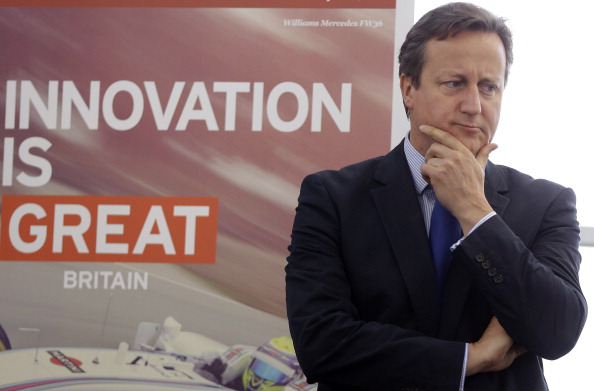David Cameron really needs his party to win at least 40% support. That won’t be easy. What, then, must Cameron do? YouGov’s latest poll for Prospect sets out his, and his party’s strengths and weaknesses.
David Cameron is a lucky leader. He has been able to blame Labour for the tough measures his government has taken. He is likely to fight next year’s election against a backdrop of a recovering economy and rising living standards. He faces an opponent that most voters think is too weak to be Prime Minister. The scene is set for what should be a decisive Conservative victory.
Yet that’s not where we are heading. The Conservatives may well end up as the largest party in the new House of Commons; but Cameron needs to increase his appeal substantially if he is to achieve the kind of majority he needs in order to have five years to do what he really wants to do, rather than rely on co-operation with Liberal Democrats, the placid behaviour of his more Eurosceptic backbenchers, a fair wind from Northern Ireland’s Democratic Unionists – or some mixture of all three.
At the moment, Labour holds a narrow lead over the Tories. If we assume that the next nine months conform to the pattern of past Parliaments, Conservative support is likely to rise, while Labour slips. On their own, however, such shifts would simply make the Tories the largest party in a severely hung Parliament – say, Conservatives 300 seats, Labour 290. Cameron would not merely have failed to lead his party to a clear-cut victory; he would have presided over a net loss of seats. It’s not clear that he could even remain his party’s leader, let alone Prime Minister.
To be sure of staying on in Downing Street, Cameron probably needs his party to gain enough seats to allow it to govern alone. This does not necessarily mean the 326 seats that deliver an overall majority. If the Tories won, say, 315 seats, they would be able to outvote the combined forces of Labour and Liberal Democrat. (It was their failure to do this in 2010, when the 307 Tory MPs faced a total of 314 Labour and Lib Dem MPs, that made a formal coalition essential if Cameron were to become Prime Minister).
With 315 seats, the Conservatives would be likely to count on Northern Ireland’s eight or nine Democratic Unionist MPs, at least in major confidence and financial votes. In practice, Britain could have a reasonably stable Conservative-only minority government – provided that Cameron’s opponents on his own backbenches kept their rebellions to a minimum.
However, with Cameron committed (a) to a referendum on Britain’s membership of the European Union and (b) to being able recommend a vote to stay in, following negotiations with the other 27 member states, he will want to marginalise those Conservative MPs who are determined to campaign for withdrawal. He will remember John Major’s problems with the anti-EU “bastards” in the 1990s – when Major had a slim overall majority. Cameron really needs to have at least 340 Tory MPs, and preferably nearer 350.
That is the context in which his, and his party’s current ratings should be judged. The Conservatives have had around 33% support in recent months. In the normal course of events, that might drift up to around 36-37% as the general election approaches – for example as some voters who currently support UKIP return to their Tory home in order stop Ed Miliband becoming Prime Minister. But Cameron really needs his party to win at least 40% support. That won’t be easy. It would mean adding three percentage points to the 37% share they won in 2010 – something no Prime Minister has achieved since Lord Palmerston in 1857.
What, then, must Cameron do? YouGov’s latest poll for Prospect sets out his, and his party’s strengths and weaknesses. Let’s start with his strengths – the reasons why the Conservatives are only narrowly behind Labour and can reasonably hope to edge ahead by continuing to steer their present course.
Leadership
First, Cameron’s lead over Miliband looks solid. When people are asked who would make the best Prime Minister, Cameron leads by 15% - in line with his average over the past 12 months. In our latest survey we also road-tested Theresa May and Michael Gove: who do people think would be the best Prime Minister if either of them led their party? With May at the helm, the gap narrows to just five points. With Gove, Miliband jumps into the lead, by as much as 13 points. So not only does Cameron outshine Labour’s leader; he does better than two of his most high-profile cabinet colleagues.
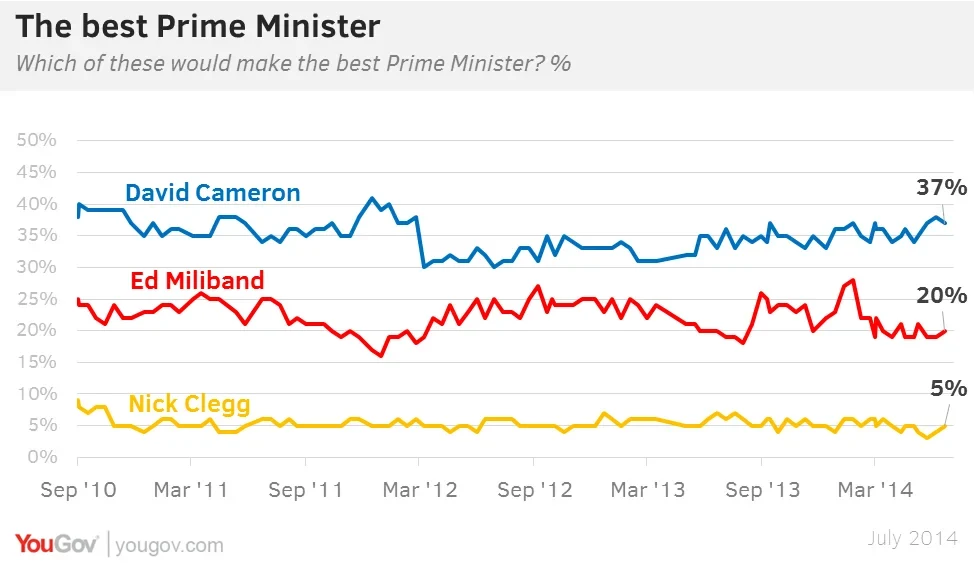
Progress
Secondly, as I have reported before in Prospect, the Conservatives also hold an emphatic lead over Labour as the party most trusted to run the economy. This month’s YouGov/Prospect poll underlines this advantage. 51% of voters think the Government has made progress towards “making Britain’s economy stronger” and “tackling the Government’s financial deficit”. Virtually the same proportion, 50%, credit Cameron as a leader who “is prepared to take the tough decisions in the long term”.
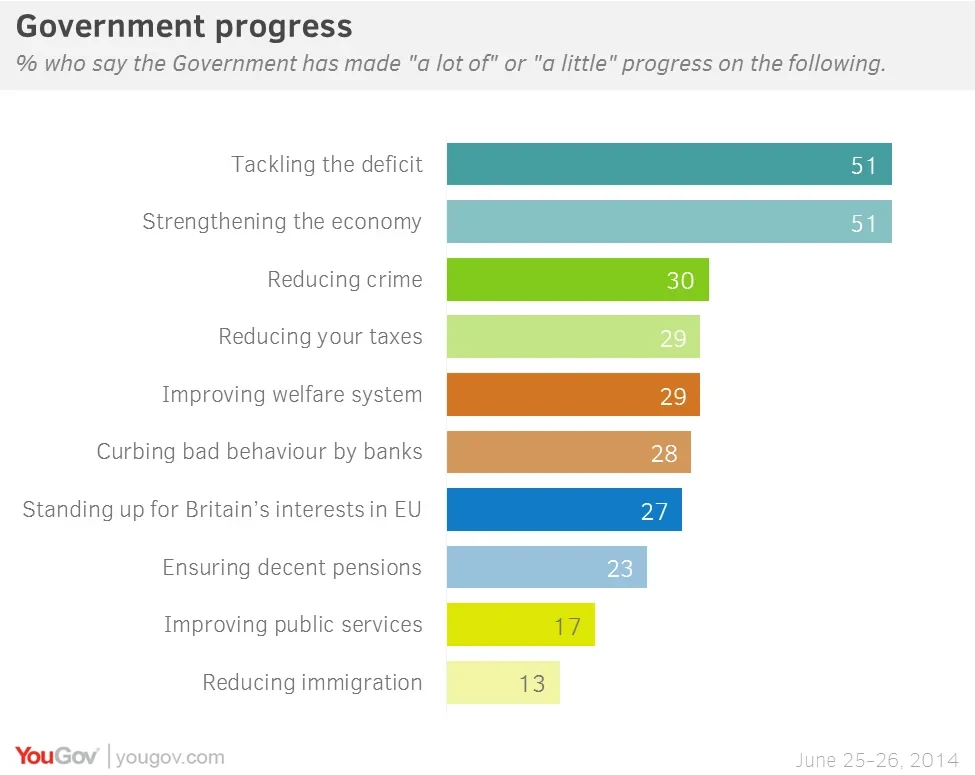
That’s the good news. If all else were equal, these figures would translate into a clear Tory victory next May, provided that the economy continues to recover. But all else is not equal. Our survey identifies two major vote-losing weaknesses in the Cameron “brand”.
The first concerns the Government’s record. The economy apart, most voters think the coalition has failed across the board. Majorities of around two-to-one say it has made no progress in reducing crime, creating a better system of welfare benefits, reducing the taxes “paid be people like you”, curbing the bad behaviour of some banks and big businesses or “standing up for Britain’s interests in the European Union”. Ensuring a decent retirement pension is seen as an even bigger failure – and only 13% think ministers have made any progress in reducing immigration.
Ministers might well complain that these verdicts are unfair. Crime is down, welfare reform is under way, a big increase in the personal tax allowance means that most people pay less income tax, and the Government has reintroduced the earnings link for state pensions. On Europe the record is mixed: Cameron gained a small, short-lived bounce either side of Christmas 2011 when he kept Britain out of plans to bail out weaker Eurozone countries and then announced his plans for a referendum on EU membership; he suffered an equally short-lived dip recently when he failed to stop Jean-Claude Juncker from becoming the new President of the European Commission. Immigration is probably the only point on which ministers have no real grounds for disputing the public verdict.
The trouble is that when perceptions collide with reality, perceptions matter more. Once again, Cameron should heed the warning from the Major years. Tony Blair, then Labour’s new, fresh-faced leader, pilloried the Conservative government for messing up the National Health Service. Voters believed him. And although waiting lists were too long, and Major’s ministers made mistakes (as do all ministers, if truth be told), nobody would guess from the polls of public perceptions that the NHS treated more and more people, year after year, and on the whole reasonably well.
Cameron’s first big task, then, is to succeed where Major failed, and persuade voters that his government has done rather better than most of them think. He has one big advantage. His predecessor was crippled by a collapse in public confidence triggered by Black Wednesday, in September 1992, when the pound crashed out of Europe’s Exchange Rate Mechanism. At a stroke, the central pillar of the manifesto on which the Tories had been re-elected five months earlier, collapsed. Cameron has the opportunity, which Major lacked, to build a narrative on the foundation of public approval of his economic record.
(The irony is that after Black Wednesday, and arguably because of it, Britain’s economy did extremely well. Living standards grew far more between 1992 and 1997 than they are going to between 2010 and 2015. One of Cameron’s great advantages is that voter blame Labour, not the Tories, for sluggish growth between 2010 and last year, whereas Major had no way of deflecting blame for Black Wednesday.)
Image
The second big weakness that Cameron must address is his own image. By two-to-one, voters don’t trust him to keep his promises. By even wider margins, they feel “he is far more interested in helping the rich and powerful than people like me”. And by 72-20% they agree that “he doesn’t really understand the problems faced by normal people in their everyday lives”.
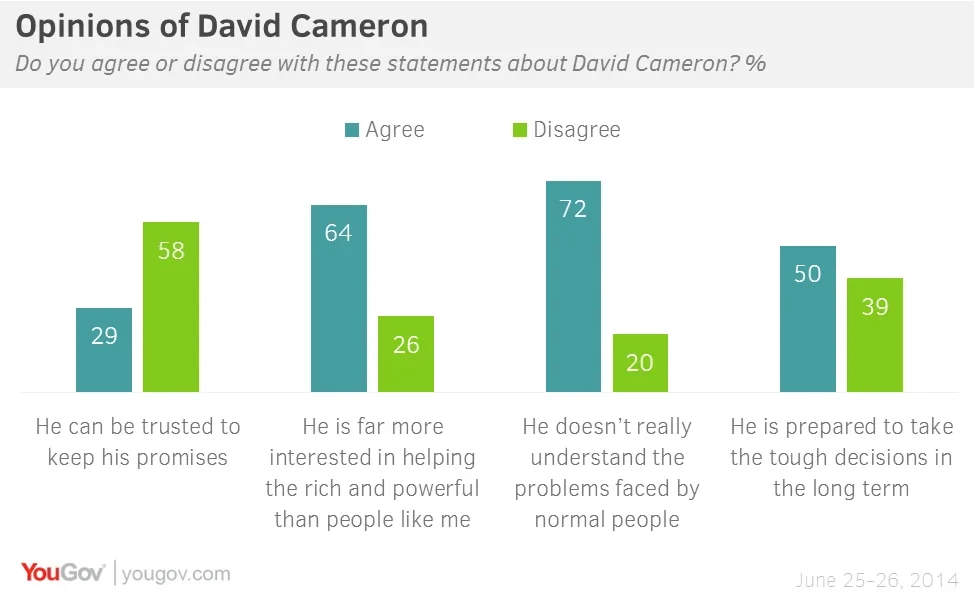
Cameron is unlikely ever to rid himself entirely of his reputation as a toff. He can change his policies but not his past. He will always be an old Etonian who went on to Oxford. But Tony Blair also attended a posh school and went to Oxford, yet when he party leader he was not generally seen as an out of touch toff (at least, not until after the Iraq war). It can’t be just because Blair played in a student rock group, Ugly Rumours, rather than join the Bullingdon Club.
The big obvious difference between Blair and Cameron is, of course, their party. Blair dragged Labour towards the centre, and abandoned any pretence that he supported traditional socialist policies. He even played down some of his redistributive policies. But even in his most aggressive, jettison-the-past, New Labour phase, he connected with the party’s traditional supporters. Even if they didn’t think he was of them, they believed he was for them.
Cameron’s problem is not just his personal background, but his mixed record at modernising his party. When Blair jettisoned Labour’s long-held commitment to ‘Clause 4’ socialism, nobody doubted that this was a cathartic moment in the party’s history. When Cameron embraced gay marriage, he failed to achieve the same effect. Too many progressives regarded it as no more than a modest gesture in their direction, while too many of his own traditionalist supporters saw it as a kick in the teeth for their values. He drove more traditionalists into the arms of UKIP than he attracted social liberals to his party.
The upshot can be seen in the answers to our question about their reaction to the prospect of a Cameron-led Conservative government next year’s general election. Even more people (48%) say they would be dismayed by this than the 44% who told us last month they would be dismayed by a Miliband-led Labour government.
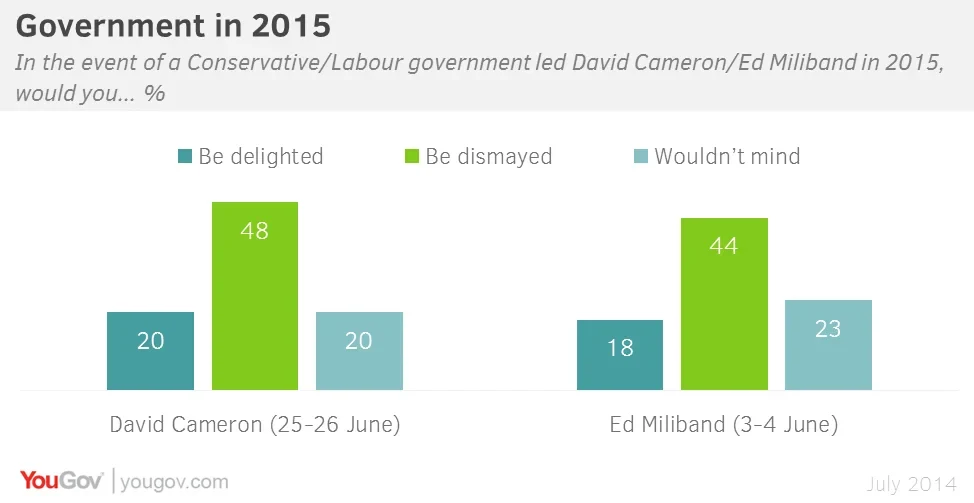
Cameron, then, must change both his own image as a remote toff and his party’s image as one that is uncomfortable with today’s world. His desire to be “heir to Blair” hasn’t worked. Perhaps he should overcome his evident reluctance to accept the advice of his right-wing critics inside his own party, and act more like Margaret Thatcher – not in the sense that they mean, which is to lurch to the Right, but by learning from her success in attracting many traditional Labour voters to her banner.
That success was rooted in a narrative that combined some clear, specific policies into a narrative that we came to know as “Thatcherism” – council house sales, trade union reform, privatisation and lower income tax. Moreover, it was a narrative that appealed to the growing band of home-owning skilled working class voters.
Cameron would doubtless argue that he has made equally specific pledges on welfare, taxes, immigration and Europe. Somehow, he has failed to combine them into a sufficiently compelling story of where five more years of his premiership would take Britain. After all, nobody talks of “Cameronism”.
Not everyone would welcome another political “ism”. They can be divisive and even dangerous. But if Cameron fails to define himself rather better than he has done until now, then others will choose their own way to define him. And for too many voters, that definition will be shaped by his privileged past, his still-disliked party and, the economy apart, the perceived failures of his government.
Postscript
The above analysis, which appears in the August issue of Prospect, was written before last week’s cabinet reshuffle. YouGov’s latest poll for the Sunday Times shows that Cameron has made his ‘definition’ problem even tougher. We repeated a question we asked in late March – do people think he has made it clear what he stands for? The proportion saying he has done so has tumbled from 57% to 40%, while the figure for those who say he has not, has jumped from 31% to 44%.
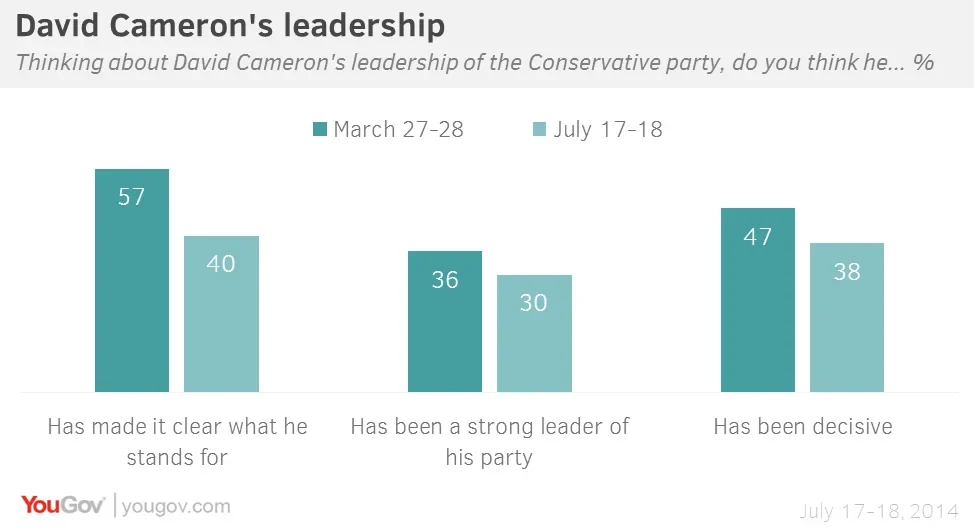
He is also seen as weaker and less decisive than in March. The Prime Minister may have felt that he had to move Michael Gove because of Gove’s ‘toxic’ ratings as Education Secretary – but he has paid an immediate price in terms of his own reputation. More than ever, Cameron must dispel the notion that he is merely an out-of-touch tactician who blows with the wind and sways with the polls.
Imag: Getty
